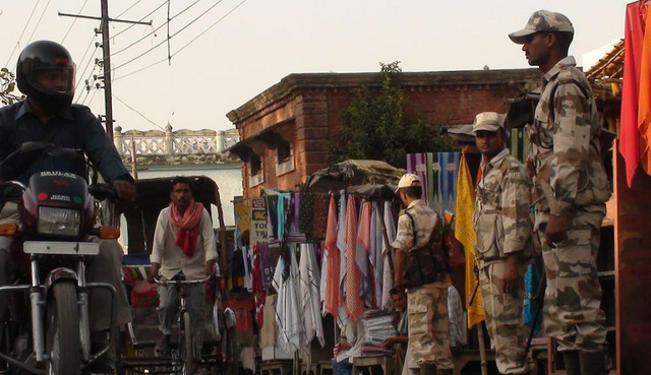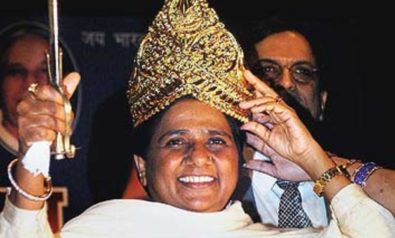Despite harsh North Indian winter, Uttar Pradesh is feeling the heat of rising political temperatures. Local assembly polls are scheduled for February and March and the major players in the political spectrum are jostling for the initial edge. In this political climate, the temperature is certain to rise further.
Uttar Pradesh is very significant politically. The largest state in India, it is represented by 80 of a total 542 Parliamentarians in Parliament, the highest for any state in the country. The upcoming polls are therefore seen as a precursor to the national elections due in 2014.
Its size does not translate into prosperity, however. With nominal private investment in industry, huge numbers of power outages, falling agricultural production and increasing crime, the state has become a perennial laggard on all development indicators. Going by the issues raised on the campaign trail, development appears to be the lowest priority for the major political parties.
The Congress Party ruled the state virtually uninterrupted after India attained independence from the British in 1947. It created a Frankenstein’s monster built on caste and religion to serve its own political ends. But the party was devoured by it in 1989 and has since faded into political obscurity. In the assembly polls in Uttar Pradesh in 2007, the Congress obtained a mere 8.5%of the vote share – the lowest in its electoral history.
Rahul Gandhi leads the party in the state. He has also already been anointed as the heir apparent to the Prime Minister Manmohan Singh, in the tradition of the dynastic culture prescribed to by the Congress Party.
In an effort to gain a foothold in Uttar Pradesh, Rahul has been camping in the state for the past three years. The media hype envisions him as the rescuer of a moribund Congress party. The Indian media – which acts more as a hand maiden to the Congress party rather than an unprejudiced observer of political events -predicts a revival for the Congress party since its vote share increased to 18% in the national elections in 2009. The fact that the national and local elections are fought on completely different issues has been conveniently ignored by the media.
The recent actions of the Congress party, however, betray an anxiety over its anticipated performance at the polls. The party is apprehensive of public ire over the numerous financial scandals which have rocked its United Progressive Alliance (UPA) coalition in New Delhi.
The Congress party needs to perform outstandingly in Uttar Pradesh to entertain any realistic chance of retaining power in the2014 national elections.
Given the proclivity of the Congress for dynasty politics, Rahul is assured of retaining his numero uno status in the party, irrespective of the results in Uttar Pradesh. But a poor result is bound to seriously dent the party’s credibility as a contender for power at the national level. Uttar Pradesh has therefore become its litmus test.
The Muslim Vote
The Congress, in an act of desperation, has resorted to its time-tested tactics of ratcheting up the Muslim card in an attempt to lure the Muslim voter to the party fold. Muslims, who account for 18% of the population of Uttar Pradesh, are assumed to influence the result in 115-120 seats out of a total of 403 seats in the state.
The UPA government’s decision to provide a 4.5% quota to the minorities in government jobs and educational institutions is seen as a Machiavellian attempt to influence the Muslim voter. The decision announced just prior to the Uttar Pradesh election is ostensibly meant for all minorities, but in reality is an electoral sop for the Muslims.
Salman Khurshid, the Union Minister for Law, lifted the veil of ambiguity about Muslim appeasement when he promised to raise the Muslim quota to 9%, provided the Muslims voted the Congress to power in Uttar Pradesh.
The statement, which earned Salman opprobrium from the Election Commission of India, is seen as a blatant manipulation of the Muslim voter. The fact that the Constitution of India prohibits any quota on the basis of religion has been deliberately obscured in the electoral dust.
Muslim fundamentalists have been further assuaged by the Congress which prohibited the author Salman Rushdie from making an appearance at a literary event at Jaipur in the state of Rajasthan. Rushdie is a pariah amongst some Muslims because of his controversial novel The Satanic Verses. He has frequently visited India, even after his book was banned in the country, without any problems.
But in a bid to pander to the fundamentalist Muslims, the Congress party led Rajasthan government hoodwinked Rushdie with false security threats forcing him to cancel his scheduled visit. The organizers were subsequently compelled to cancel the hastily arranged video conferencing for Rushdie, ostensibly because of a perceived threat to “law and order”.
The Congress party, in its quest to regain Uttar Pradesh, is not willing to antagonize the Muslim community before the elections. The fundamental democratic concept of freedom of expression which is the cornerstone of a vibrant democracy has therefore been sacrificed at the altar of political expediency.
But the Congress is not the only party in the state indulging in the politics of appeasement for electoral benefits.
The Samajwadi party (SP), literally translated as the Socialist party, has also been a player in the appeasement of Muslim fundamentalists. The SP, which draws support from among the economically affluent backward classes, has historically taken advantage of the electorally potent combination of the backward classes and the Muslims.
In a bid to project itself as a protector of Muslim interests, the SP upped the ante on the Congress’s announcement of 9% quotas for Muslims by assuring the Muslims of a quota of 19% for the community in proportion to their population in the state.
The SP has also fallen prey to the dynastic politics that was once the forte of the Congress party. In an apparent counter to Rahul Gandhi, Akhilesh Yadav, the son of the party supremo Mulayam Singh Yadav is leading the counter charge of the SP.
The scions, bereft of any ideas for development and with only family lineage as their calling card, therefore can only offer inducements in the form of Muslim appeasement to dupe the gullible voter.
The S.P, which functions like a personal fiefdom is also seen as a party which introduced the concept of politicization of criminals, by nominating persons with criminal antecedents for elections in a bid to utilize their muscle power.
Uttar Pradesh, much like Italy, has been carved up amongst various Mafiosi and their spheres of influence. But the local Mafiosi were initially permitted electoral respectability by the SP, which unfortunately has now become a practice for all political parties.
The introduction of criminals into politics led to the natural corollary of corruption becoming the prime motive of the politicians.
Mayawati , the undisputed leader of the Bahujan Samaj Party (BSP) and the present Chief Minister of Uttar Pradesh, epitomizes the stranglehold of corruption on the polity of the state.
Mayawati’s “social engineering” formula which ensured a political alignment of the upper caste Brahmins and the lower caste Dalits, combined with her opposition to the criminals provided her party with an unprecedented mandate to rule the state in 2007.
But like the despots of the past, Mayawati frittered away the mandate by utilizing her tenure to build her own statues and monuments. Her egregious tenure has witnessed financial scams of monumental proportions and wastage of public money in building of personal monuments.
Mayawati, a schoolteacher before she joined politics under the tutelage of the Dalit leader Kanshi Ram, has seen her financial assets increase from Rs. 16.7 million) in 2004 to Rs. 870 million in 2010. Ironically, for a leader who came to power because of her campaign against crime, Mayawati is now being investigated for having disproportionate financial assets.
The UPA coalition in New Delhi, with Congress as the major partner, has ensured that the noose around Mayawati’s neck has not been tightened in the disproportionate financial assets case. She has in turn obliged by rescuing the UPA government by tacitly supporting it on crucial issues in Parliament.
The meteoric rise of right wing nationalist Bharatiya Janata Party (BJP) in the late 1980s was helped in no small measure by the Muslim appeasement policy of the Congress party. The appeasement of the Muslims drove the disillusioned Hindu middle class into the arms of the BJP which was then advocating a strident nationalism.
The BJP is seen as an untouchable party by the Muslim voters in Uttar Pradesh who blame the party for its role in the demolition of the disputed Babri mosque in Ayodhya in 1992. In the absence of any support from the Muslims who constitute a substantial proportion of the electorate in the state, the party has an uphill electoral battle to fight.
The BJP was seen to be gaining ground in the backdrop of the alleged financial embezzlements indulged in by the UPA coalition at national level and by the incumbent Mayawati regime in Uttar Pradesh.
But the BJP seems to have shot itself in the foot by bringing a tainted former minister – allegedly the lynchpin behind the monumental scams of the Mayawati government – into its fold.
The BJP leadership, despite attempts at damage control, has not been able to justify its choice of leader to its sympathisers. He is perceived to have no loyalty to the party ideology. The BJP, which referred to itself “as the party with a difference” on the issue of corruption, does not appear this way after the sordid episode.
The BJP’s electoral endeavor in Uttar Pradesh is also being damaged by the perception of it being a party with more leaders than cadres. The factionalism in the party is proving to be an impediment to the resurgence of the BJP in Uttar Pradesh.
The BJP’s declining popularity in Uttar Pradesh can be judged from its plummeting vote share which from a high of 36% in the 1998 national elections fell to 12% in 2009. The party needs to perform exceptionally well in the upcoming polls in the state since any repeat of the 2009 national elections would send the party into political oblivion. It is also bound to damage the BJP’s bid for power in the national elections in 2014.
Uttar Pradesh, which sets the political agenda for India, is therefore left with a Hobson’s choice between parties devoid of ideology fighting for their own political survival. Bereft of any developmental plans and vision, the political bankruptcy of the major political parties in the state has reached frightening proportions. For a state which has given India 8 out of their 14 Prime Ministers, the signs are ominous.
The views expressed in this article are the author's own and do not necessarily reflect Fair Observer’s editorial policy.
Support Fair Observer
We rely on your support for our independence, diversity and quality.
For more than 10 years, Fair Observer has been free, fair and independent. No billionaire owns us, no advertisers control us. We are a reader-supported nonprofit. Unlike many other publications, we keep our content free for readers regardless of where they live or whether they can afford to pay. We have no paywalls and no ads.
In the post-truth era of fake news, echo chambers and filter bubbles, we publish a plurality of perspectives from around the world. Anyone can publish with us, but everyone goes through a rigorous editorial process. So, you get fact-checked, well-reasoned content instead of noise.
We publish 2,500+ voices from 90+ countries. We also conduct education and training programs
on subjects ranging from digital media and journalism to writing and critical thinking. This
doesn’t come cheap. Servers, editors, trainers and web developers cost
money.
Please consider supporting us on a regular basis as a recurring donor or a
sustaining member.
Will you support FO’s journalism?
We rely on your support for our independence, diversity and quality.







Comment